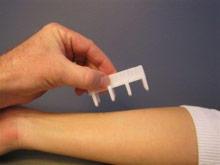
- What is Sublingual Immunotherapy - January 6, 2020
- Folded Ear in Newborns: Treatment Options - April 11, 2018
- Newborn Ear Deformity: What Can Be Done? - April 11, 2018
- Ear Molding: An Overview - November 2, 2017
- Otoplasty for Protruding Ears - September 26, 2017
- Basal Cell Carcinoma: Facial Reconstruction Timing - September 26, 2017
- Clinical Considerations of Mohs Reconstruction of Cheek Defect - September 26, 2017
- Basal Cell Carcinoma: Nasal Bridge Reconstruction - September 26, 2017
- Skin Cancers Involving the Eyebrow: Clinical Considerations - October 3, 2016
- Treatment of Multiple Skin Cancer Lesions - June 1, 2016
- Skin Cancer: Nasal Reconstruction and Scar Management - June 1, 2016
Allergies occur when the body mistakenly identifies a harmless substance– such as dust mites or pollen– as a threat and reacts to it with an immune response. Individuals with allergies suffer from symptoms that can interfere with their quality of life. There are many treatments for allergies including avoidance, medication, and immunotherapy, which is a form of desensitization. Immunotherapy can be administered via sublingual immunotherapy (SLIT – also known as allergy drops) or subcutaneous immunotherapy (SCIT – also known as allergy shots).
SLIT has been shown to be equally effective to allergy shots as a means to treat allergies while avoiding injections. A patient must first have an allergy test to determine what substances trigger an allergic reaction. If positive, the patient will begin a customized treatment program that will desensitize them to the specific allergens they react to. In the case of SLIT, this will be in the form of a tablet or drops. Allergy shots (SCIT) is also customized but is an injection into the deltoid/arm.
The SLIT treatment is placed in a dropper and the patient will dispense 1-3 drops under their tongue to absorb. This is done daily, thus exposing the body to a small dose of allergen. This daily exposure provokes an immune response in the patient. SLIT works by exposing patients to a small dose of an allergen repeatedly over an extended period of time which builds resistance to it.
Sublingual Immunotherapy has proven to be an effective treatment for individuals with rhinitis– irritated and or inflamed nasal membranes– caused by sensitivity to dust mites, ragweed, cat dander, grass, and tree pollen. The treatment is currently being tested for its efficacy in controlling food allergies and eczema. Additionally, people with asthma may benefit from SLIT if their allergies trigger asthmatic symptoms or attacks. SLIT is contraindicated in patients who are allergic to any ingredient in the serum besides the targeted allergen, have previously had a bad reaction to sublingual immunotherapy, have severe asthma, a history of severe allergic reactions, or eosinophilic esophagitis (esophageal inflammatory disease).
This treatment does not provide immediate symptom relief. It builds the body’s immunity over time, sometimes years. Sublingual immunotherapy is yet to be approved by the FDA but has been proven effective in studies and is used as off-label treatment.
During the course of Sublingual Immunotherapy therapy, patients will have several follow up evaluations. These visits will allow assessment symptom scoring, an evaluation of the patient’s treatment usage, and may also include lung evaluation in the asthmatic patient. Because SLIT is administered by the patient, risks include deviating from the prescribed treatment schedule which would prolong the treatment and make it less effective. To prevent this, the patient should adhere strictly to their treatment schedule.



